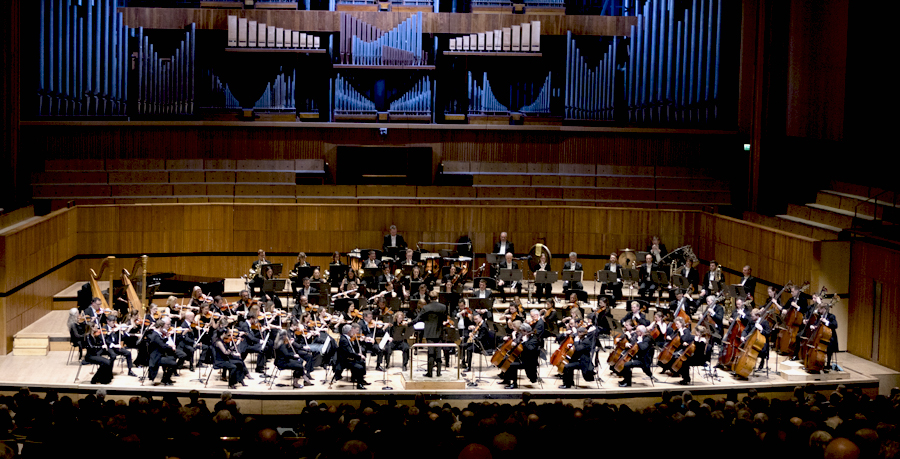On Sunday 23 March the Royal Philharmonic Orchestra returned to the Royal Festival Hall at Southbank Centre for the second concert of our 2025 series, Lights in the Dark, with Music Director Vasily Petrenko. The programme featured three émigré composers who moved to the United States between the wars; Erich Korngold, Béla Bartók and Sergei Rachmaninov. We were joined by pianist Bruce Liu, winner of the XVIII International Chopin Competition.
Read on to see photos and reviews from the evening.
Listen to this concert on BBC Sounds

The concert opened with a short introductory speech from Vasily, who introduced the music that had all been written within ten years of each other by those who had fled war and revolution in Eastern Europe, but each composer had their own distinctive voice. Commenting on how Bartók composed his Concerto for Orchestra while staying in hospital, under the clouds of war he knew were raging back in his homeland:
"The last movement has inevitable movement towards celebration, towards the spirit of victory and spirit of freedom."

First came music from Korngold's The Sea Hawk, the score written for the 1940 film starring Errol Flynn as an English privateer in the Elizabethan age. Korngold, who had been a child prodigy, was a famed opera composer and professor at the Vienna State Academy, and accepted an invitation to come to California in 1934 to write film music, escaping the rising tide of fascism in Austria. This swashbuckling score is filled with heroic horn calls and swoon-worthy sweeps in the strings, exemplifying Korngold's signature sound that defined Hollywood music for generations to come, incorporating leitmotifs and lyricism imported from the late-Romantic operatic music of the Old World that the composer was steeped in.
"Korngold’s rich harmonic palette and stirring melodies were outlined with evident affection." Bachtrack ⭐⭐⭐⭐
Read the review

Rachmaninov was a wandering émigré; after the Russian Revolution of 1917 he spent the following decades living between the United States and Switzerland, spending his time touring and performing, meaning that he had little time to compose. One piece he did complete was his Rhapsody on a Theme of Paganini, a set of variations for piano and orchestra based on the legendary Italian violinist's Caprice No.24. Although by no means the first to compose variations on this theme, it is quintessential Rachmaninov, incorporating a show-stopping display of virtuosity for the soloist, rich Romantic harmonies, and the composer's characteristic inclusion of the haunting Dies Irae plainchant: the distant call of the world he left behind, and now long gone.

"From the start this was a gripping collaboration, nothing routine or indulgent from a forthright traversal that gained much from Liu’s technical wizardry, delicacy of tone and crystalline articulation, all delivered by his hunched posture over the keyboard... etrenko presided over an ideal account, with gratifying wind solos, and enabling rising tensions to develop naturally." Bachtrack

Bruce Liu played Liszt's La Campanella for an encore.

"Maximising the glow and refinement of Rachmaninov’s more sustained passages, Liu provided several variations with witty payoffs that felt completely fresh before demonstrating his thrilling virtuosity in the demonic closing variations." Classical Source
Read the review

The circumstances in which Bartók's Concerto for Orchestra was composed were not fortuitous. Having struggled to adapt to a new life in New York, the Hungarian composer spent a stint in hospital with leukemia, and he might well not have composed anything again but for a commission by fellow émigré and conductor Serge Koussevitzky. Reminiscent of the Baroque concerto grosso form, the work showcases each instrument of the orchestra, instead of a single traditional soloist. There is nothing but sheer brilliance and inventiveness in the orchestration, from a sequence of instrumental duets in a 'Game of Pairs' to a satirical dig at Shostakovich's Seventh Symphony. Bartók described the work as a journey from darkness into light; 'a gradual transition from the sternness of the first movement and the lugubrious death-song of the third, to the life-assertion of the last one.’ The piece was the final large-scale work Bartók heard performed live, conducted by Koussevitzky, before his death in 1945.

"This meticulously prepared account, showcasing each section of the RPO, unfolded in an unbroken sweep arguably bringing its constantly shifting vistas into sharper focus and allowing for accumulating momentum." Bachtrack

"As a showpiece giving every section of the orchestra its place in the sun, it served here to demonstrate the growing confidence and stylishness of the RPO in every department." Classical Source
Thank you to everyone who attended the concert, and we sincerely hope you enjoyed it. Our next appearance at the Royal Festival Hall will be on Sunday 27 April as we perform Shostakovich's Symphony No.7, accompanied by a specially-made video installation by Kirill Serebrennikov and Ilya Shagalov.

All photos © Frances Marshall, text by Tim Lutton.

